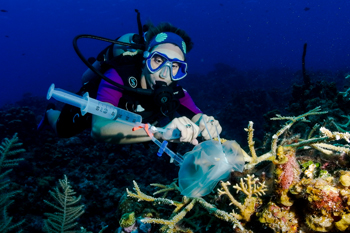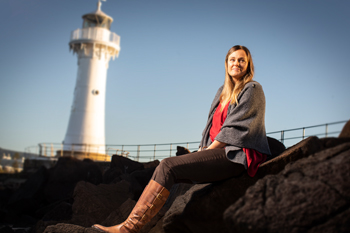Marine researchers receive Max Day Awards
- 3 mins read


Dr Emma Camp from the University of Technology Sydney is one of the recipients of the 2020 Max Day Environmental Science Fellowship Award. Photo: Rolex/Franck Gazzola.
A new study on the Great Barrier Reef assessing how the elemental signatures of coral reefs can signal stress from pollution will be carried out by one of the recipients of the Australian Academy of Science’s 2020 Max Day Environmental Science Fellowship Award.
Dr Emma Camp will conduct her research at the University of Technology Sydney using samples of three different coral species that will be subjected to conditions mimicking polluted and non-polluted reef environments.
Dr Camp will use the award to investigate the elemental signatures of corals and how changes in these signatures might be diagnostic of environmental pollution on the Great Barrier Reef. An elemental signature is the unique proportion and concentration of elements in an organism or object and can change as the environment changes.
“This project will explore how the elemental signatures of each part of the coral responds to environmental change with the aim of identifying unique stress signatures in corals”, Dr Camp said.
“The project will enhance our understanding of biogeochemical cycling across coral environments, and how this influences coral traits and the associated costs of survival, thereby revealing the processes that govern coral reef resilience.”

Ms Allison Broad, a PhD candidate from the University of Wollongong, received the 2020 Max Day award.
The other recipient of the 2020 award is PhD student Ms Allison Broad from the University of Wollongong. Ms Broad will study the impacts of anchor scour on the seafloor near Wollongong.
Seabed environments are the foundations for biodiversity in the marine domain and are at risk of damage from the heavy anchors and chains used by shipping vessels.
For Ms Broad’s research, specific study sites within a rocky reef habitat will be identified and assessed using remotely operated vehicles and underwater video. Assessments will be done both before and after an anchoring event by a large merchant ship (greater than 200 m in overall length) to monitor and quantify both the disturbance from anchor drop, drag and chain scour and the recovery of invertebrates, algal forests and fish assemblages.
“With the rise of the Blue Economy, it is vital that we identify how marine industries may be interacting with these seabed environments and that we manage them sustainably wherever possible,” Ms Broad said.
The award provides up to $20,000 for early-career researchers working on the conservation of Australia’s flora and fauna, the ecologically sustainable use of resources and the protection of the environment and ecosystem services.
It is named in honour of Academy Fellow, the late Dr Maxwell Frank Cooper Day AO FAA, who spent a lifetime championing entomology, conservation and forestry, as well as helping other scientists.
Four researchers were also ‘highly commended’ for the Max Day Environmental Science Fellowship Award:
- Dr Catherine Price from the University of Sydney for her project: When it takes one bite: deceiving herbivores to protect rare and threatened orchids;
- Ms Emily Scicluna from La Trobe University for her project: Using personality and cognitive assessment of individuals as a conservation tool for improving reintroduction/translocation success;
- Ms Georgia Sinclair from RMIT University for her project: Developing biomarkers of environmental exposure to poly- and perfluoroalkyl substances to improve environmental policy and health; and
- Dr Tatiana Soares da Costa from La Trobe University for her project: Fighting herbicide resistance with vitamin deprivation.
More information about the Max Day Environmental Science Fellowship Award





